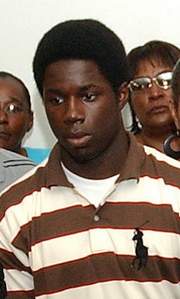Louisiana's Proliferations of Societal Apathy❗❗ Just Don’t LookLandry was confused as to why people who were not religious would be offended by the mandatory displays. “They don’t have to look at the poster,” said Landry. “Everybody gets their feelings hurt so much. Back when we grew up, it was like, ‘Sticks and stones may break your bones, but words will never hurt you.’” The state of Louisiana is facing increased pushback in its efforts to force Christian teachings into its public schools. After a June mandate to put Ten Commandments in schools was passed by the governor, a lawsuit challenge has forced the new law's implementation to be partially put on hold. This month, a hearing is set for the case that could be instrumental in deciding the ultimate outcome. The La., red state mandate is insidiously connected to an attempt to convince the citizenry that this is all about abiding by the law. That, if public school students; (not private school classrooms, receiving public funds) see the (Ten)10 Commandments on posters in their classrooms, they'll be more apt to obey the law.When, at the same instance, the Louisiana governmental 'supermajority' passed a law giving 18 year olds' the right to conceal carry without a permit.The governor signed the bill into law. The general public is not aware of this governmental hypocrisy in this red state. However, since in reality, 'we wrestle against spiritual wickedness in high places' the effects of such goings on, trickle down to the subconsciousness of 'every' citizen, unknowingly. And the "just don't look" mantra towards children, who interact beyond race, faith, dress and culture, is ludicrous. The students are Hindu, Muslim, Judaism, Christian & other(Buddhist,Tao, Atheist). Anyone can see through this attempt to 'shine us on.' Other Issues creating apathy abound
Furthermore, the effort to invoke fear into voters, voters' registrations and such is intimidating too many unfamiliar with their rights as voters.
The term the government of Louisiana uses is election integrity.
During the time of the redistricting court battles the then Attorney General Jeff Landry, filed motions in the Fifth Circuit Court of Appeals to attempt to redefine 'what is black', in order to diminish the two-third minority/black voting strength. The current A.G. Liz Murrill was the now Governor's main litigator in such instances.
Other Issues creating apathy abound
Furthermore, the effort to invoke fear into voters, voters' registrations and such is intimidating too many unfamiliar with their rights as voters.
Who is Black? In Louisiana, there's a lot at stake in how that's answered
Legally speaking…what does it mean to be Black? And what does that mean for voting rights in Louisiana? Charisse Gibson explains the court case. Author: Charisse Gibson / WWL Louisiana Published: 10:24 PM CST November 15, 2022Updated: 6:10 PM CST November 16, 2022-Who is Black? In Louisiana, there's a lot at stake in how that's answered
AG wants narrow definition of Black
As the midterm elections approached, part of the argument that drew national attention to both cases was the standard of “blackness” or who gets to identify as “Black.”
In “Robinson v Ardoin,” Attorney General Jeff Landry argues for a narrower definition of "Black" and how that "definition" can be used in Section 2 Voting Rights cases.
In court documents, Landry advocates the use of what he calls "DOJ Black," namely, "those who are 'Black' and those who are 'Black and White.'"
“Our argument to the court is anyone who checks black should be identified as black in terms of drawing a new map,” Evans said. “The argument of the Secretary of State and the Attorney General is that it’s too broad of a definition that you cannot be considered black unless that is your only race.”
This sort of thing, has created such apathy in the 'atmosphere' in the currents of subliminal thoughts in the peoples' minds, unbeknownst to them.
In the end, the 5th Circuit three judge panel ruled against the now Governor's ploy.
“I identify as Afro-Asian. My Mom is an immigrant from Korea and my dad is five generations here in Louisiana, Black,” Angel Chung-Cutno, an educator in New Orleans said. “I grew up in a Black or White town. It made it challenging for me and for other people to put me on either side of the line because people like to organize and have boxes you can fit into."For some like Angel, it can be difficult to be put into just one box.
“I always had to choose a box and usually it was called other,” Angel said. “So I became familiarized with that box even though it feels very otherized to say you don't fit into anything else, you're something we can’t identify.”
irml
As the midterm elections approached, part of the argument that drew national attention to both cases was the standard of “blackness” or who gets to identify as “Black.”
In “Robinson v Ardoin,” Attorney General Jeff Landry argues for a narrower definition of "Black" and how that "definition" can be used in Section 2 Voting Rights cases.
In court documents, Landry advocates the use of what he calls "DOJ Black," namely, "those who are 'Black' and those who are 'Black and White.'"
“Our argument to the court is anyone who checks black should be identified as black in terms of drawing a new map,” Evans said. “The argument of the Secretary of State and the Attorney General is that it’s too broad of a definition that you cannot be considered black unless that is your only race.”
This sort of thing, has created such apathy in the 'atmosphere' in the currents of subliminal thoughts in the peoples' minds, unbeknownst to them.
In the end, the 5th Circuit three judge panel ruled against the now Governor's ploy.
“I identify as Afro-Asian. My Mom is an immigrant from Korea and my dad is five generations here in Louisiana, Black,” Angel Chung-Cutno, an educator in New Orleans said. “I grew up in a Black or White town. It made it challenging for me and for other people to put me on either side of the line because people like to organize and have boxes you can fit into."
For some like Angel, it can be difficult to be put into just one box.
“I always had to choose a box and usually it was called other,” Angel said. “So I became familiarized with that box even though it feels very otherized to say you don't fit into anything else, you're something we can’t identify.”
irml

.jpg)









No comments:
Post a Comment